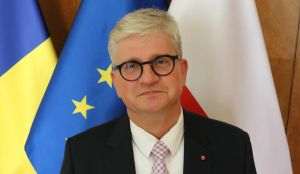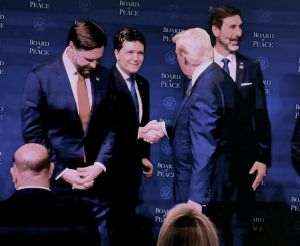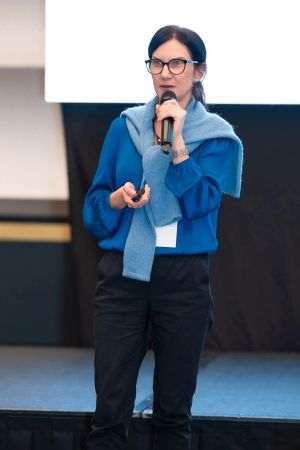Ursula von der Leyen announced the launch of a major project dedicated to the defense of Europe's eastern flank, with a focus on the Black Sea area, which she described as "the cornerstone of a credible defense." ""Europe's Eastern Flank keeps the whole of Europe safe. From the Baltic Sea to the Black Sea. That is why we must invest in supporting it through an Eastern Flank Surveillance Operation. This means providing Europe with independent strategic capabilities. We must invest in real-time surveillance of the space so that no movement of forces goes unnoticed. We must heed the call of our Baltic friends and build a wall of drones. This is not an abstract ambition. It is the cornerstone of a credible defence. A European capability developed together, deployed together and supported together, which can respond in real time. One that leaves no ambiguity about our intentions. Europe will defend every corner of its territory,” said Ursula von der Leyen in her State of the Union address, underlining the urgent need to strengthen common defence, with a focus on the strategic Black Sea region.
The President of the European Commission said that she would present a clear roadmap for new joint defence projects at the next European Council, with clear targets for 2030 and a European Defence Semester. The plan is part of a wider package of measures to strengthen European security. Ursula von der Leyen announced the "Qualitative Military Advantage”, a new programme through which Europe will frontload six billion euros of the ERA loan and conclude a drone alliance with Ukraine. In parallel, the "Preparedness 2030” programme could attract up to 800 billion euros in defence investment, and the SAFE mechanism already makes 150 billion euros available for joint public procurement, with 19 Member States involved. Von der Leyen explained that Vladimir Putin's war economy will continue "even if the war stops” and Europe must be prepared to take responsibility for its own security. "Only a strong and credible European defense posture can guarantee our security,” she said.
Her speech also touched on the dimension of the Union's enlargement, seen as a condition for European independence. "For Ukraine, for Moldova, for the Western Balkans - their future is in our Union. Let's make the next reunification of Europe possible,” von der Leyen said.
• Protecting European products, a priority for Von der Leyen
On the economic front, the Commission head pleaded for massive investment in digital and clean technologies, for cutting red tape and for strengthening the single market, still "unfinished,” according to the Letta report. A Roadmap for the Single Market until 2028 was announced, targeting capital, services, energy and telecommunications. At the same time, a Scale-up Europe Fund will be launched, designed to support young companies with high potential in strategic areas such as artificial intelligence, biotechnology or quantum technologies.
"A European artificial intelligence is essential for our future independence," von der Leyen stressed, presenting investments in AI gigafactories and digital testing infrastructures.
At the same time, to stimulate clean industry, the Commission will launch the "Battery Booster" package, with 1.8 billion euros for European battery production, and will introduce "Made in Europe" criteria in public procurement.
The President of the European Commission also promised strong social measures: a law on quality jobs, a European strategy to combat poverty by 2050, a plan for affordable housing and a legislative initiative on short-term rentals.
For the agri-food sector, von der Leyen called for "fair competition and a level playing field" for European farmers and announced a new "Buy European Food" campaign.
The President of the European Commission said: "We also need to strengthen the position of farmers in the food chain. For too long, their hard work has not paid off as it should. Farmers have the right to a fair price for their food and a fair profit for their families. We will review the implementation of our legislation on unfair trading practices and intervene where necessary. And I can announce today that we will increase our promotion budget to launch a new "Buy European food' campaign. Because we can proudly say that our European food is the best in the world.”
• Bilateral trade agreements, to diversify supply chains
In external relations, the leader of the European Union Executive reaffirmed the importance of the trade partnership with the United States, but also the need to diversify global agreements, including completing negotiations with India by the end of this year.
Ursula von der Leyen said: "Our trade relationship with the US is the most important. We export over euro500 billion worth of goods to the US every year. Millions of jobs depend on it. As President of the Commission, I will never gamble with jobs or people's livelihoods. That is why we made a deal to maintain market access for our industries. And we made sure that Europe got the best deal possible. I do not believe in tariffs. Tariffs are taxes. But the agreement provides crucial stability in our relationship with the US at a time of serious global uncertainty. Think about the repercussions of a full-blown trade war with the US. Imagine the chaos. And then put that image next to the one from China last week. China flanked by the leaders of Russia and North Korea. Putin boasts that relations between Russia and China are at an unprecedented level. None of this is a big surprise. But it reflects the changing landscape. And it creates two imperatives for Europe's efforts for independence and for its place in the world. The first is that we must redouble our efforts for diversification and partnerships. 80% of our trade is with countries other than the US. So we must seize the new opportunities. At a time when the global trading system is collapsing, we are ensuring global rules through bilateral agreements. As in the case of Mexico or Mercosur; or concluding negotiations on a historic agreement with India by the end of this year. We will also build a coalition of like-minded countries to reform the global trading system, because this trade allows us to strengthen our supply chains. We will open markets, we will reduce dependencies, because ultimately it is about strengthening our economic security. The world wants to choose Europe. And we must do business with the world”.
Finally, Ursula von der Leyen warned of hybrid threats and attacks on European democracy. She announced the creation of a European Centre for Democratic Resilience and the launch of a Media Resilience Programme, aimed at supporting independent journalism and combating disinformation. "A free press is the backbone of any democracy. And we will support European press to remain free,” concluded the President of the European Commission, outlining a vision of a more united, stronger and more independent Europe.
• Siegfried Mureşan: " We will be able to invest more in security if our economies are strong”
European democracies are under attack, and the Union must respond with security, competitiveness and investment in modern infrastructure, said Siegfried Mureşan, the European Parliament's chief negotiator for the European Union's multiannual budget 2028-2034, on the occasion of the State of the EU address by Ursula von der Leyen, President of the European Commission.
Siegfried Mureşan, EPP Vice-President, said: "We in the European Union are surrounded by autocrats. Autocrats want to weaken us, the ones who cooperate. Look at their photo from Beijing! They are autocrats who are attacking our neighbours, our values, our cyberspace and our democracies. Disinformation, cyberattacks, provocations and electoral interference are their weapons, and they are looking for servants inside the 27 Member States of the Union. They provoke us from outside and they provoke us from within. If we just look away, we will not be protected. No one else will protect us if we do not protect ourselves. And it is clear that to live in peace, we must be strong.”
The Romanian MEP underlined the interdependence between security and economy: "We will be able to invest more in our security if our economies are strong and the private sector will invest more in our economies if it feels safe. And to be protected, more is needed. Food security is essential. We cannot have national security if we do not have a secure and modern infrastructure: energy, digital, innovative, modern, as well as transport infrastructure, large, cross-border projects that protect our common market and smaller projects, deeply anchored at local and regional level”. In Siegfried Mureşan's opinion, these priorities must also be supported by adequate funding: "These priorities should also be reflected in the way we spend European funds. And that is why we believe that, as we now engage in working on the Union budget for the next seven years, we should defend these priorities together in the work we will carry out: security, competitiveness, security and good infrastructure, strongly anchored at the local level”.
Basically, Siegfried Mureşan's message outlines the strategic direction of the European Union: without security, competitiveness and solid infrastructure, European democracies cannot withstand internal and external pressures.

















































